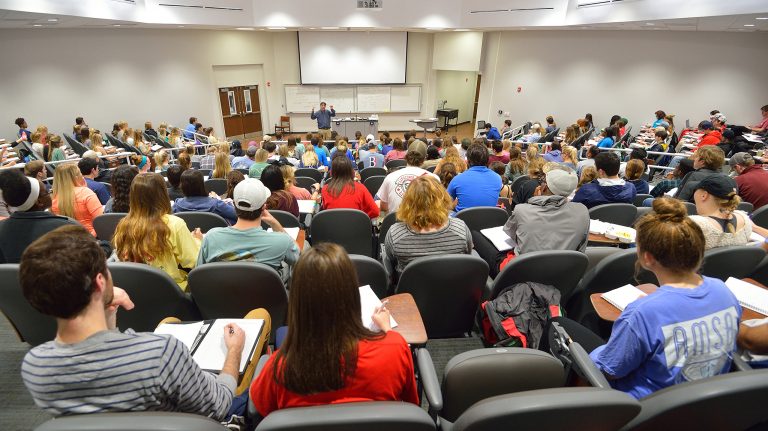Program tailors lessons based on individual student needs
MARCH 30, 2017 BY

The PLATO program allows students in large lecture classes to get a personalized learning experience.Photo by Robert Jordan/UM Communications
The University of Mississippi’s College of Liberal Arts is implementing a method of personalized learning for students in large courses.
The Personalized Learning and Adaptive Teaching Opportunities Program, or PLATO, uses adaptive and interactive lessons to personally engage students in classes such as biology, chemistry, writing and rhetoric, and mathematics, all of which generally have high enrollment.
PLATO is funded by a $515,000 grant awarded by the Association of Public Land-grant Universities and the Bill and Melinda Gates Foundation, which will oversee the initiative.
Through adaptive learning, instructors incorporate online lessons with class lectures. Coursework through the online system recognizes student responses and provides follow-up assignments based on each student’s answers.
Kerri Scott, instructional associate professor of chemistry and biochemistry, began using online homework in her Chemistry 101 sections in 2008. As the classes grew to more than 200 students, she sought ways to expand learning methods.
“I am always on the lookout for new and better ways to communicate with students, and technology that adapts to their needs is ideal,” Scott said. “It allows us to tailor the assignments based on the needs of the student.
“Instead of me standing in front of a chalkboard telling 200 students to solve the problem a certain way, now they’re getting targeted with their own individual assignments and study plans.”
Additionally, modules include content basics of the course as well as assessments, so class time can be used for deeper discussion of the material or active practice. The courseware also gives instructors additional data on student performance on assignments beyond a single grade, allowing them to identify students who are struggling with the material before the first high-stakes exam.
This strategic use of technology improves traditional learning and strengthens the general education curriculum, said Stephen Monroe, assistant dean of the College of Liberal Arts and an assistant professor of writing and rhetoric.
“We are grateful to the APLU and the Gates Foundation for their support,” Monroe said. “Our project is succeeding because of our wonderful faculty and Patti O’Sullivan’s leadership.
“Our students will be the ultimate beneficiaries. Adaptive courseware personalizes learning for our students, who can receive customized pathways through their homework assignments and then arrive to class better prepared for lectures and activities.”
Six other University of Mississippi faculty members are piloting the program this semester: biology professor Tamar Goulet and instructor Carla Carr, college algebra instructor Michael Azlin, trigonometry instructor Jon-Michael Wimberly and statistics lecturer Lanzhen Song and instructor Cody Harville.
Carr is using the LearnSmart technology of the courseware, which offers students an active reading experience.
Before each topic, students are assigned text to read in their eBook for the course. The adaptive courseware provides questions for students to answer as they read, making class preparation an assignment.
“Hopefully, the students are now gaining comprehension of what they’re reading, which will enhance lectures, rather than arriving to class unprepared,” Carr said.
Azlin is piloting the ALEKS adaptive courseware system in two sections of college algebra this semester. ALEKS provides an initial knowledge check that allows an individualized pathway through the homework goals of the course for each student.
“This initial knowledge check also allows me to see where each student, as well as the class as a whole, stands on each topic in the course,” Azlin said.
The grant will allow PLATO to expand across other sections of Chemistry 101 and writing and rhetoric courses in the fall semester.